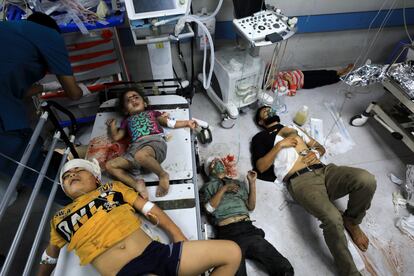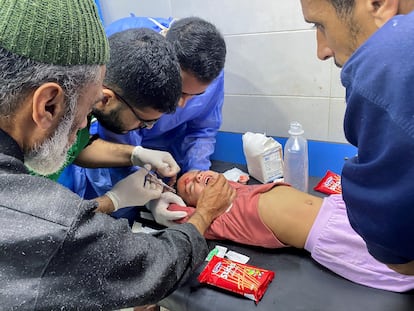Siege by Israeli army forces excavation of mass grave in Gaza’s main hospital
Those responsible for the Al Shifa health complex claim that they have buried between 120 and 180 decomposing corpses, including those of premature babies disconnected from incubators due to lack of power


The siege to which Israeli forces have subjected Gaza’s main hospital since last Friday has forced Palestinians to dig a mass grave in the Al Shifa health complex in the capital of the enclave, where dozens of corpses were at risk of decomposition, including those of seven premature babies disconnected from incubators due to the lack of power. Hospital officials claim to have buried between 120 and 180 bodies, according to various testimonies cited by international news agencies. The hospital lacks food, water and electricity. Alongside some 650 patients, including 36 premature babies who cannot be evacuated, there are some 7,000 civilians displaced from their homes by the fighting and seeking refuge in the vicinity of the complex. Doctors Without Borders described the situation at Al Shifa as “inhumane,” on social media.
Israel has maintained a military siege of the hospital compound, where it considers one of the main command posts of the Hamas militias is hidden. The White House claimed Tuesday that it had information from its intelligence services confirming that Hamas was using Al Shifa for a “command and control mode” and probably to store weapons, which amounts to “a war crime,” National Security Council spokesman John Kirby said.
In recent hours, the Israel Defense Forces (IDF) have offered to provide portable incubators and fuel for electric generators, but neither the management of the hospital nor the World Health Organization (WHO) believe that there are sufficient guarantees for the safety of patients in the presence of snipers and armed drones around Al Shifa, which has been stormed by Israeli forces. According to the hospital’s director, Mohamad Abu Salmiyeh, the lives of 30 premature babies are at risk as incubators are not functioning. Israeli military spokesmen also claim to have opened an evacuation corridor, which health officials in Gaza deny.
All hospitals in northern Gaza have stopped functioning, with the sole exception of al-Ahli. “They are out of service due to the lack of electricity, medical supplies, oxygen, food and water, in addition to the shelling,” said the United Nations Office for the Coordination of Humanitarian Affairs. Meanwhile, the WHO insisted Tuesday that evacuating the Al Shifa hospital is an “impossible task,” while reporting 20 patient deaths at the same facility in the last 48 hours. U.S. President Joe Biden has warned that Gaza’s health centers “must be protected” and called on Israeli authorities to carry out “less intrusive action relative to the hospitals.”
Israeli military spokesmen claim to have taken control of the main public buildings in Gaza City, such as the headquarters of the Hamas government, the parliament, and several militia barracks. The capital of Gaza has become a ravaged battlefield from where more than a million people have fled since the beginning of the war. “The Hamas organization has lost control in Gaza: Terrorists are fleeing south,” Israeli Defense Minister Yoav Gallant said Monday night. The army, which has published videos and photographs of weapons allegedly stored by Hamas in the basement of Gaza’s abandoned Rantisi hospital, has so far acknowledged the deaths of 46 IDF military personnel since it launched its offensive on the enclave.

4,600 children killed in Gaza
An attack by Islamist militias left 1,200 people dead — three-quarters of them civilians — in Israel on October 7 and another 240 were kidnapped and taken to Gaza. Two-thirds of the Gaza’s 2.3 million inhabitants have been displaced by the conflict, which has claimed the lives of at least 11,320 people, including more than 4,600 children and 3,100 women, according to local health authorities. The same source claims that 25 of the 35 hospitals in the Palestinian coastal territory have ceased to function.
Palestinian Health Ministry spokesman Asharf al-Qidra told Reuters Tuesday that there were dozens of decomposing bodies in the Al Shifa compound that could not be moved outside, as they could not be protected by the International Committee of the Red Cross. This humanitarian organization has reiterated that hospitals are under the protection of wartime international humanitarian law. “But if they hide healthy combatants or weapons caches, they can lose that protection,” warned a Red Cross official.
In an unusual gesture, the Israeli Minister of Foreign Affairs, Eli Cohen, and Health Minister Uriel Menachem Buso defended the Israeli army’s siege of several Gaza hospitals for security reasons before the WHO in Geneva, according to the EFE news agency.
The U.N. agency for Palestinian refugees (UNRWA) has warned that with the supplies now entering Gaza, it only has food for 39% of the people sheltering in its schools during the Israeli offensive. According to data from UNRWA itself, it is currently hosting some 137,000 refugees in its 80 schools in Gaza. So far, only 980 trucks carrying humanitarian aid have entered the Palestinian territory through the Rafah crossing, which links the enclave with Egypt, according to U.N. data. Before the war, some 500 trucks of humanitarian aid entered Gaza daily to cover the basic needs of its inhabitants, according to U.N. data.
In Tel Aviv, dozens of relatives of the Israelis kidnapped by Hamas began a five-day march to Jerusalem Tuesday in a fresh challenge to Prime Minister Benjamin Netanyahu’s government, which they blame for not doing enough to free the 240 people being held hostage in Gaza. The demonstrators plan to end their protest on Saturday in front of the prime minister’s residence in Jerusalem.
Hamas has stated that it is willing to release 70 of its hostages — the women and children — in exchange for a truce and the release of 275 Palestinians — also including women and children — imprisoned in Israeli jails. President Biden said Tuesday he is “convinced” that a release of hostages will be achieved soon, in a process in which Qatar is mediating. “Hang in there, we’re coming,” he said in a message from Washington.
On the complex northern front, the IDF has launched new attacks on southern Lebanon in response to rocket fire by the Iran-backed Hezbollah militia. Israeli fighter jets have also bombed Hezbollah positions. Israeli anti-aircraft defense systems intercepted a “suspicious target” off the coast of the city of Acre, in the northwest of the country. Since the beginning of hostilities on the northern front, at least 103 deaths have been recorded: 10 in Israel (seven soldiers and three civilians) and at least 93 in Lebanon, including 72 members of Hezbollah, eight members of Palestinian militias and 13 civilians. On the southernmost front, in the city of Eilat on the Red Sea coast, the Arrow anti-missile system had to be activated Tuesday due to the threat of a rocket fired by pro-Iranian rebels from Yemen.
Sign up for our weekly newsletter to get more English-language news coverage from EL PAÍS USA Edition
Tu suscripción se está usando en otro dispositivo
¿Quieres añadir otro usuario a tu suscripción?
Si continúas leyendo en este dispositivo, no se podrá leer en el otro.
FlechaTu suscripción se está usando en otro dispositivo y solo puedes acceder a EL PAÍS desde un dispositivo a la vez.
Si quieres compartir tu cuenta, cambia tu suscripción a la modalidad Premium, así podrás añadir otro usuario. Cada uno accederá con su propia cuenta de email, lo que os permitirá personalizar vuestra experiencia en EL PAÍS.
¿Tienes una suscripción de empresa? Accede aquí para contratar más cuentas.
En el caso de no saber quién está usando tu cuenta, te recomendamos cambiar tu contraseña aquí.
Si decides continuar compartiendo tu cuenta, este mensaje se mostrará en tu dispositivo y en el de la otra persona que está usando tu cuenta de forma indefinida, afectando a tu experiencia de lectura. Puedes consultar aquí los términos y condiciones de la suscripción digital.








































